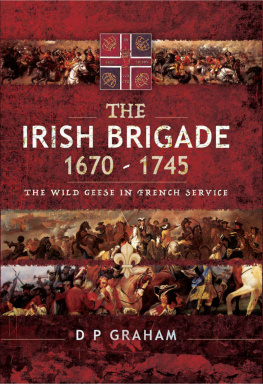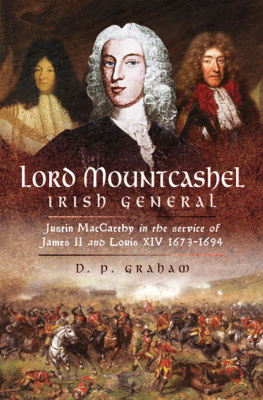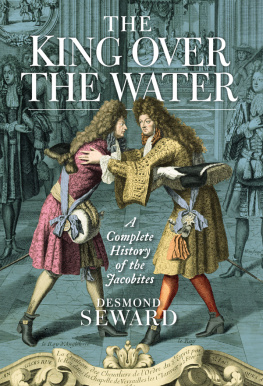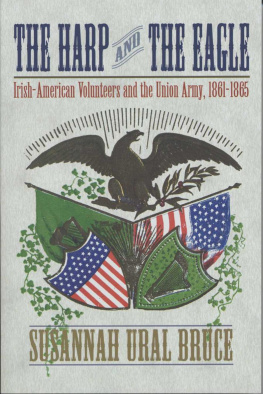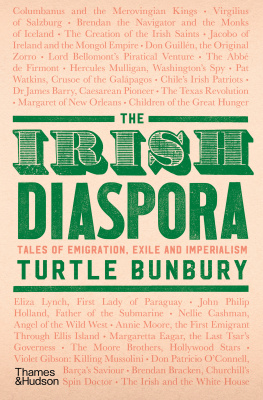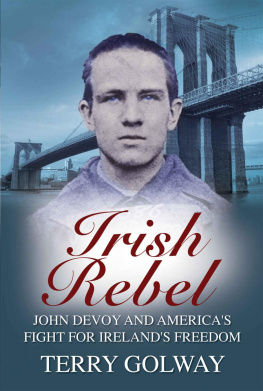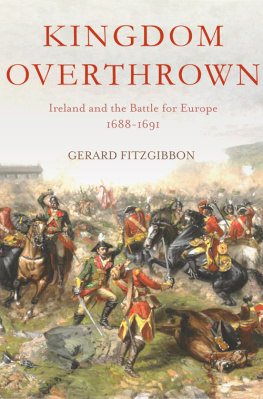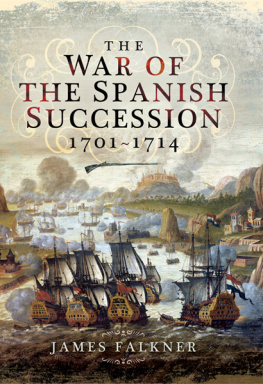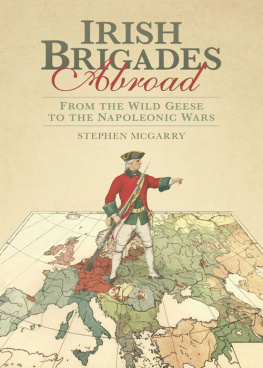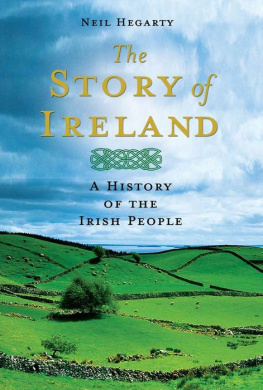The Irish Brigade 16701745
The Wild Geese in French Service
D. P. Graham
First published in Great Britain in 2019 bya
Pen & Sword Military An imprint of
Pen & Sword Books Ltd 47 Church Street
Barnsley South Yorkshire
S70 2AS
Copyright D.P. Graham 2019
HB ISBN 978 1 52672 773 2
PB ISBN 978 1 52676 624 3
eISBN: 978 1 52672 774 9
Mobi ISBN: 978 1 52672 775 6
The right of D.P. Graham to be identified as Author of this work has been asserted by him in accordance with the Copyright, Designs and Patents Act 1988.
A CIP catalogue entry for this book is available from the British Library.
All rights reserved. No part of this book may be reproduced or transmitted in any form or by any means, electronic or mechanical including photocopying, recording or by any information storage and retrieval system, without permission from the Publisher in writing.
Pen & Sword Books Ltd includes the Imprints of Pen & Sword Aviation, Pen & Sword Family History, Pen & Sword Maritime, Pen & Sword Military, Wharncliffe Local History, Pen & Sword Select, Pen & Sword Military Classics, Leo Cooper, The Praetorian Press, Remember When, Seaforth Publishing and Frontline Publishing.
For a complete list of Pen & Sword titles please contact
PEN & SWORD BOOKS LIMITED
47 Church Street, Barnsley, South Yorkshire, S70 2AS, England
E-mail:
Website: www.pen-and-sword.co.uk
Contents
Siil a Rn
I wish I was on yonder hill
Tis there Id sit and cry my fill
til every tear would turn a mill
Is go dt t mo mh irnn sln*
Chorus (after each verse):
Si il, si il, si il a r n
Si il go sochair agus si il go ci in
Si il go doras agus alaigh liom
Is go dt t mo mh irnn sln
Ill sell my rock, Ill sell my reel
Ill sell my only spinning wheel
To buy my love a sword of steel
Is go dt t mo mh irnn sln
Ill dye my petticoats, Ill dye them red
And round the world Ill beg my bread
Until my parents shall wish me dead
Is go dt t mo mh irnn sln
I wish, I wish, I wish in vain
I wish I had my heart again
And vainly think Id not complain
Is go dt t mo mh irnn sln
But now my love has gone to France
To try his fortune to advance
If he eer comes back, tis but a chance
Is go dt t mo mh irnn sln
* Go, go, go, my love
Go quietly and go peacefully
Go to the door and fly with me
And may you go safely, my darling
(Si il a R n (pronounced Shule Aroon meaning Go, my Love) is a traditional Irish song which is sung from the point of view of a woman lamenting her lover, who has gone to France to pursue a military career. It has been suggested that the song refers specifically to the Irish Wild Geese (at the very least through the reference to France in the final verse) although it is possible that it was composed later with the intention of highlighting historical events. Johnny Has Gone for a Soldier is a well-known American variant. It is arguable that the lament is a metaphor representing the mother country, the relative plight of Irish exiles, and the vain hope of return to an Ireland which, as the years pass, becomes increasingly unrecognisable.)
Acknowledgements
I would like to thank, in no particular order, Harman Murtagh, Padraig Lenihan, and John Childs, for stirring an interest in a fascinating period, which not not die...
Foreword
M y interest in the Irish Brigade started with Justin McCarthy, Lord Mountcashel; indeed he is the topic of the first book in this series detailing the, perhaps, forgotten conflicts and personalities of seventeenth-century Europe. Where did this interest stem from? To answer that, we have to travel back to 2000, and a series of research documents. The little known Battle of Newtownbutler, fought in Ireland during the war between Jacobite and Williamite, is considered by some a large skirmish, by others a stark turning point in the war. But, perhaps more so than any other period, it is the personalities present at that battle who garner interest, and who represent a generational slice of military history in the British Isles, whose echoes are still felt: Mountcashel, Anthony Hamilton, whose brother besieged Derry, William Wolseley, who would fight at the Boyne, the Enniskilleners (Inniskillingers) and their officers, who can be found throughout the following campaign. The story and characters are the stuff of legend. Indeed, it is in this vein that we see the story emerge, for it is not simply a retelling of history that we are engaged in; there is a European context and, moreover, the genesis of the fate of a nation that underpins the events.
Step back, and refocus, and we see MacCarthy, Patrick Sarsfield, the wily Tyrconnel, James II, Berwick, his illegitimate son, and a thread that at least partially seeds the history of Europe, just as the exiled Irish brigades thread their way through the doubts and ignorance of a foreign military establishment, and gain eventual admiration from their French masters.
It is more than simply a series of facts and accepted beliefs that we deal with here, it is the story of Irishmen who are pawns in a grander scheme of the sometimes tragic, sometimes fatally flawed, story of Ireland, struggle against the odds to fight for a sometimes ungrateful king and land in foreign parts which remain foreign to most of them and, yet, their legacy remains, embellished upon the vast tapestry of European history like some vital stitch or keystone that it is impossible to ignore.
Such is the narrative of the Irish brigades; a story of exile, battle, dashed hopes and dreams of returning to their native land. Triumph and tragedy aplenty, and far from the stuffy old history of a time, and a century, which cannot be ignored. Ironically, their very presence makes the thought of repealing the penal laws that are enforced upon Ireland anathema to the British establishment, lest the long and vengeful fingers of Jacobitism, through James IIs descendants, threaten to rock the very foundations of the British Empire.
The story of the Irish Brigades and the Wild Geese has been told before. In fact, such is the popularity of the desperate band of soldiers, exiled from Ireland, searching in vain for a king deserving of their bravery and thus, ultimately, a way home and a means of escape from the yoke that bedevils their idealistic view of their homeland, has become the stuff of legends. Many stories have been told, and tales spun of those brave soldiers of the Irish Brigade. One wonders if the timing had been different, if the right leaders had made decisions at the right time, if the French had only done this or that in support of them, would the history of the British Isles have been radically different.
The Wild Geese themselves, whose very souls were thought to return to Ireland, after having fled their homeland, were destined never to return. They were recorded as wild geese in shipping records, lest their real identities be found out. Hence the adoption of the term over a period of years, as men yearned to return to an Ireland which had been romanticised and made legendary, and of course, which no longer existed.

